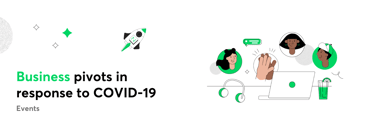The Future Landscape of Fintech. 5 Key Takeaways from Disruption Forum London

Is it possible to be an incumbent bank and a new bank at the same time? Will the future landscape of banking consist of only a handful of banks, and a few fintechs accompanied by Amazon, Apple, Facebook and Google?
These are by no means trivial questions. We tried to answer them at Netguru’s Disruption Forum London, in the Level39 building at Canary Wharf, right in the heart of the financial industry.
In order to reflect the diversity of fintech, we invited experts from the leading companies in the UK - Revolut, Starling Bank, OakNorth, Funding Circle, Lemon Way, and Monese. To spice up the event, we also asked Lloyds, one of the largest banks in Europe and one of the oldest brand in the industry, to join us at the table.
- Netguru pulled together an interesting mix of speakers and an equally interesting range of attendees for a challenging and inspiring conversation about the future of fintech - said Martin Dowson, Interim Director, Design Systems at Lloyds Banking.
- A really good event – very lively, very interactive. A good, diversified panel with people from different backgrounds, food for thought - added Chad West, Chief Marketing Officer at Revolut.
What did we serve to the close to 200 attendees from the fintech, banking and consulting community?
Tom Eilon, Head of Commercial at Funding Circle, talked about scaling fintech and lessons learnt from growth. Emmanuel De Cazotte, UK Country Manager at Lemon Way, shed some light on the partnership with Barclays. And right before our evening panel discussion, Valentina Kristensen, Director of Growth at OakNorth, shared the story of growing a multi-billion dollar fintech firm from scratch.
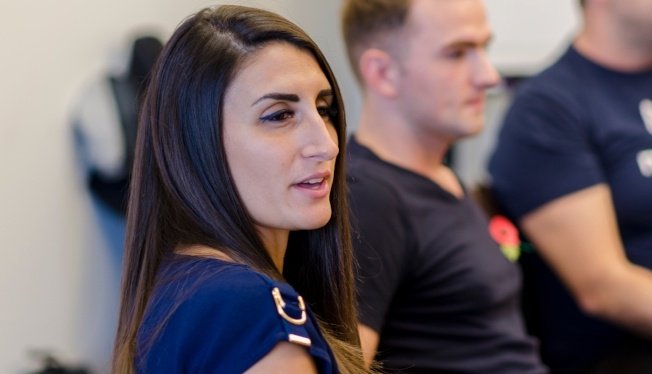
Valentina Kristensen, Director of Growth at OakNorth, shared a story: "From a startup to a billion dollar company in 2 years".
Following the experiences from our panel at Disruption Forum in Berlin with N26 and solarisBank, we wanted to create similar tension in London. We were not disappointed - it was, in fact, a gloves-off discussion with Starling Bank, Monese, Revolut and Lloyds.
The most important insights? Let me share some unstructured thoughts first.
1. Growth based on empathy
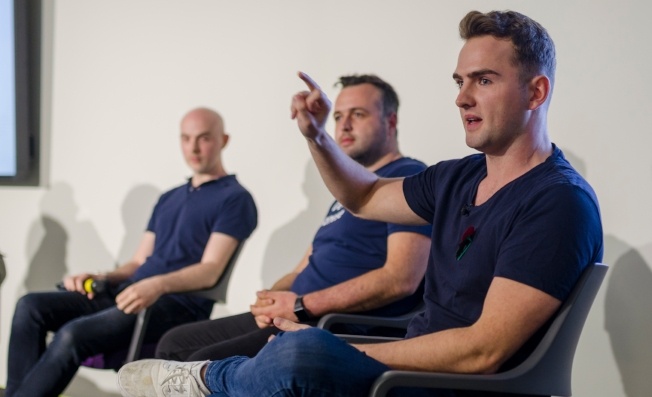
'We want to bank the world' - Chad West, CMO at Revolut (on the right). Photo: Natalia Chrzanowska
One of the questions I had for panelists was to share their insights on building loyalty. How to develop daily habits of users and transform your MAUs (monthly active users) into DAUs (daily active users)?
In a way, that is exactly what Revolut did - they started as a travel card, and then they started pulling users in with new features (e.g. budgeting controls, savings vaults, and recurring payments) and new products (crypto exchange, premium accounts). As of today, Revolut is approaching the level of 500,000 daily active users.
As we were told by Chad West, Revolut’s CMO, speed and convenience are the hallmarks of the company.
Yannis Karagiannidis, Head of Growth at Monese, UK’s neobank, highlighted the importance of speaking the same language as your users, investing in the customer service desk, and focusing on a niche group first (for Monese that were migrants and people without very detailed financial history).
- It’s very important to create a product that is inclusive. We also had an advantage of the first mover and from day one we were very transparent on pricing and other issues. It was all the little things that added up and unlocked word-of-mouth marketing for us - said Yannis Karagiannidis.
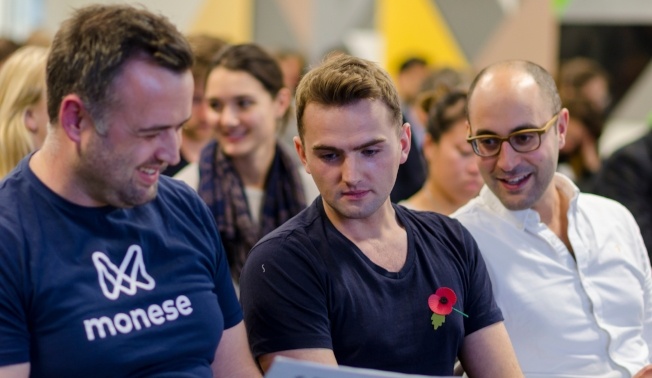
Yannis Karagiannidis, Head of Growth at Monese (on the left), reading "Fintech Times" , with Chad West (Revolut) and Tom Eilon, Head of Commercial at Funding Circle
But my favourite insight came from Ben Chisell, Product Director at Starling Bank. He was very firm in opposing the term “growth hacking”.
- Honestly, all you need to do, is getting some kind of product out there. Then you need to have empathy, listen closely to what your customers are saying. Try to solve their problems, and be pretty obsessive about it - said Ben Chisell.
- I doubt that Starling Bank can have an idea that some of the thousands of people in finance haven’t had before. It’s the execution and velocity that matter - he added.
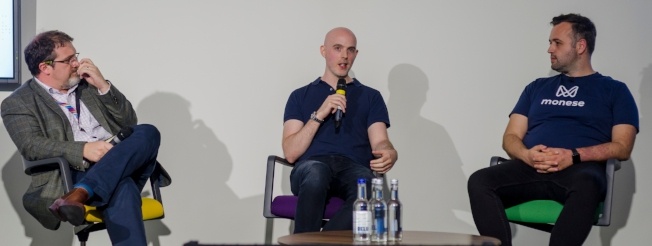
- It is about the empathy, not about growth hacking - Ben Chisell, Product Director at Starling Bank (in the middle).
His advice may sound very simple. Yet, it is perhaps striking how such a simple-sounding strategy gets complex when you’re trying to figure out how to fold it into day-to-day operations.
2. Design for prosperity
Another quote that I feel deserves to be immortalized were the remarks from Martin Dowson, Interim Director, Design Systems at Lloyds. One of the largest banks in Europe is in the midst of a transformative process, spending over 3 billion pounds on new technologies and digitisation. One part of that transformation is the investment in a design team. In the words of Dowson, Lloyds is on the path to balance the ratio between engineers and designers. But more important is the mission to figure out how, beyond money, the design team can help people prosper.

Design for prosperity - that is the challenge for Martin Dowson's team at Lloyds
- We call it “design for prosperity”. We have to figure out how - beyond money - we can help people prosper. We need to remember that we have a relationship with 30m people. And we need to understand where we are a part of their lives and where we are not. Where we need to step back, and where we need to be present and when - said Martin Dowson.
3. The App versus the API
Among different approaches to fintech growth, the one about developing a standalone product as opposed to investing in marketplaces and API connections is one of the most interesting.
Looking for an example of the first approach? Revolut.
- We want to bank the world. We want to be the one brand customers trust to manage all of the financial aspects of their lives within the Revolut app. That’s the vision we’re passionate about - said Chad West, CMO at Revolut.
In his view, customers expect more from the services they use, they want speed and convenience, and at the same time, they want to give as little information as possible.
- Consumers are becoming lazier, and rightfully so. That is the reason we don’t want to build a kind of money supermarket in the app. If we’re in control, it allows us to be more innovative, and the customer experience is better. Why would we bury our users by giving them multiple options and then forcing them to spend 20 minutes checking each offer one by one? Why not ask users what they want, and then bring the best possible value directly to them? - added Chad West.
Starling, one of the most prominent neobanks in the UK, follows the opposite path. Beyond its own products, the neobank led by Anne Boden is betting on APIs. For instance, its Banking-as-a-Platform APIs allow businesses to offer their own retail banking payment services, including card issuing as an API.
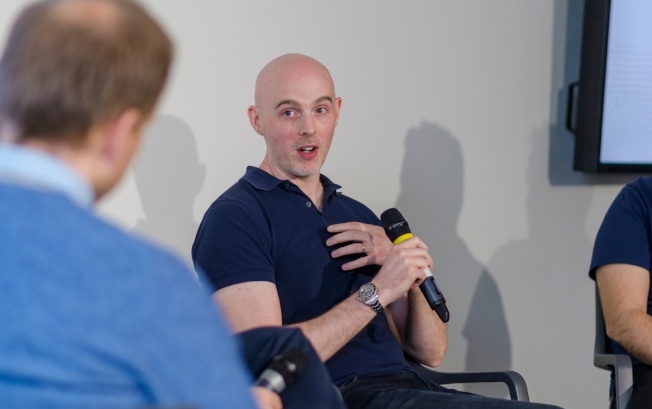
Ben Chisell is betting in favour of marketplaces as a tool for growth
- When you have a selection of products, you’re creating an ecosystem where consumers can get the best value. With an all-in-one app, you’re basically asking your customers to trust that you’re absolutely the best on the market. The thing that marketplace reverses is that you put all the offers in front of the users and ask them to trust your ranking - countered Ben Chisell, Product Director at Starling Bank.
He admitted that there are trade-offs related to this approach - e.g. keeping a consistent customer experience with all third-party products connected via API.
- Each company may have different KYC procedures and scaling that kind of platform is not an easy task. But in the marketplace, the selection of offers produces trust. And trust adds value. We don’t know at that point which vision and strategy is better. Different fintech companies have their own beliefs and they will execute on them - added Ben Chisell.
4. The next wave of disruption. What do fintech leaders think is the next threat?
The existing fintech companies already changed the financial landscape. But there's massive room for further growth and innovation. Surprisingly enough, all our panellists agreed that the Big Four in Tech, otherwise known as GAFA (Google, Amazon, Facebook, Apple), pose the biggest threat to the status quo.
Ben Chisell from Starling Bank referred to the book “Innovator’s dilemma”, illustrating how, across industries, leaders become unseated by new technology which they at first underestimated.
- I’m not arrogant to think that banking is any different. There’s no reason why Facebook or Amazon can’t do these things. If you look at Amazon, to be honest, they’re already in the banking space, they offer credit cards, business loans. - said Ben Chisell.
It is worth adding that both Revolut and Starling Bank like to refer to themselves as ‘the Amazon of banking’ or ‘the Amazon or finance’.
- If we know anything about these companies, is that they don’t want a slice. They want everything. They have the money and the power, they have the brand awareness, they have the scale and infrastructure - added Chad West.
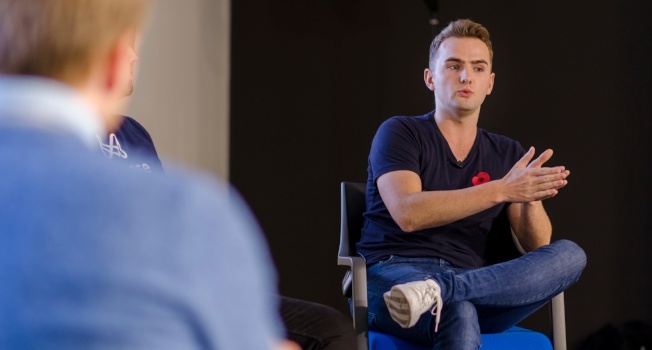
- If we know anything about these companies, is that they don’t want a slice - Chad West feels that it will be Amazon, Apple or Facebook, standing in the way of fintech companies and banks.
- They all understand design and we all know that sometimes the colour of the card comes as a factor in judging whether a bank is a good one. If you take a look at Apple, I have no doubts that they will start thinking about financial services more seriously. - he also said.
In the words of Revolut’s CMO, that is the reason that the UK company is so focused on speed. They feel that if they take the approach of thinking and planning in three or five years, they won’t make it.
Martin Dowson from Lloyds offered some additional context.
- I feel that digital identity, something related to the relationship economy, might be the next disruption that could potentially unseat GAFA as well. Because I’m not so sure we trust them (Google, Facebook, Amazon, Apple) anymore. And trust is a very volatile thing, as we’ve shown in the banking industry. There is a possibility that somebody will come in and give the people back control of their data. And data is where the whole value is in so many business models.
5. Disrupt yourself. A traditional bank and a neobank at the same time
The tension appeared again when we were discussing whether banks are able to transform. We kicked off with a quote from Ralph Hamers, CEO of the ING Group: “We are an incumbent and a new bank at the same time”.
Chad West from Revolut was rather against that point of view. His stance was that in fintech speed to market is everything, and even focusing on having a banking licence can slow you down.
- Banks can adapt and change, they’re trying, and some of them can succeed to some extent. But they can’t be fast enough - said Revolut’s CMO.
Ben Chisell from Starling Bank also was slightly sceptical. He reminded us how much effort and focus it takes to innovate within large organisations. At one point, it is essential to create a small team aligned with completely different goals than the rest of the company. The team should have the green light to innovate and celebrate each milestone, eg. reaching the 10th thousand customer, when the company counts their users in tens of millions.
- We are one of the incumbents, and they say it is one of our burdens. I believe it is also a tremendous opportunity. What we’ve learnt during the past few years is how to do agile transformation at scale. Also, we’re having the huge shift in mindset, coming from our focus on Designing for Prosperity to support our company mission of Helping Britain Prosper. It is also our reflection posed by the fintech companies - countered Martin Dowson from Lloyds.

- What we’ve learnt during the past few years is how to do agile transformation at scale - Martin Dowson, Lloyds
He added, that traditional banks may have acted slightly slower, which is understable, when we take into account their scale, infrastructure, and legacy.
- But we are close to the transformative moment of catch-up. And I do think we have an advantage over fintech companies. As I’ve said, we know now how to be agile at scale. It will be interesting to observe how new players will cope with achieving profitable, sustainable growth once they reach the maturity level - added Martin Dowson.
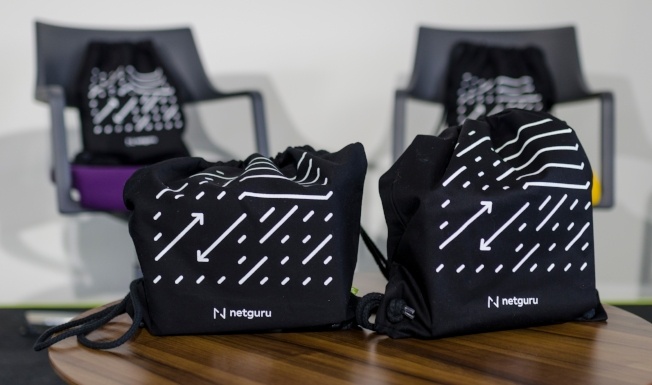
Stay tuned for more fintech analyses and insights from Netguru. More Disruption Forum events are coming in 2019!
PS. If you work in a fintech industry and would like to be included as a speaker or panelist, pitch this idea to me: tomasz.grynkiewicz@netguru.com.









-1.jpg?width=384&height=202&name=Posts02%20(1)-1.jpg)



